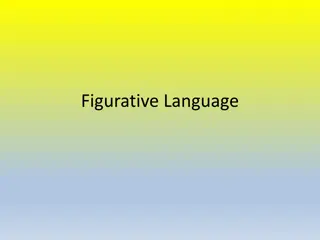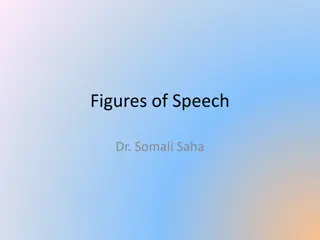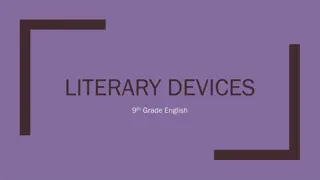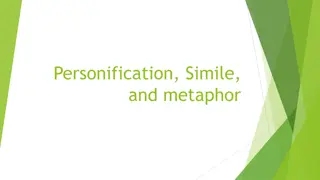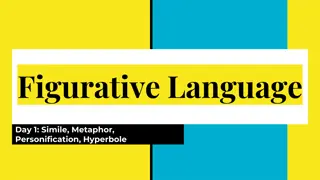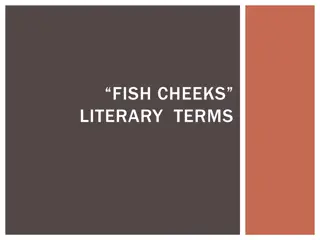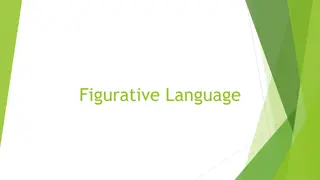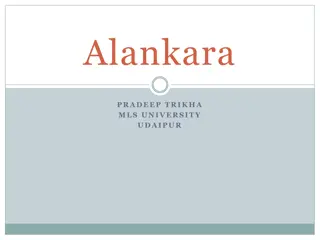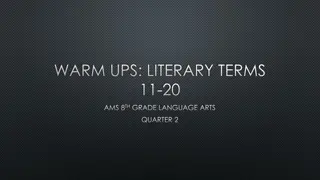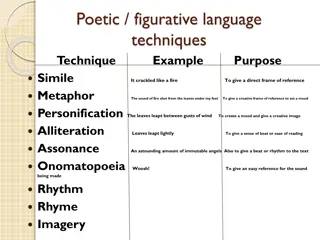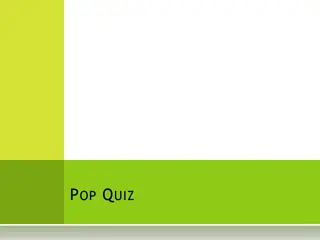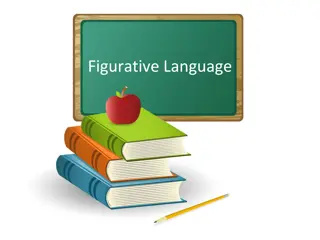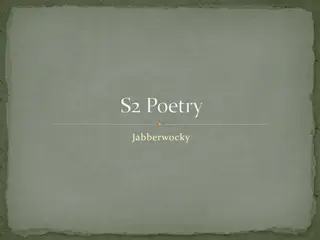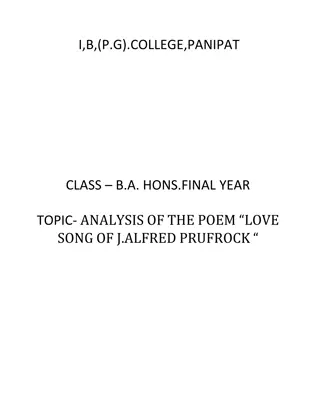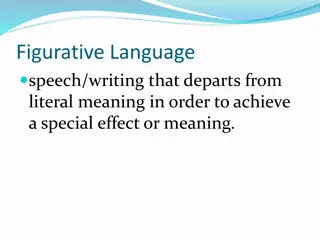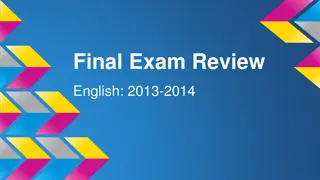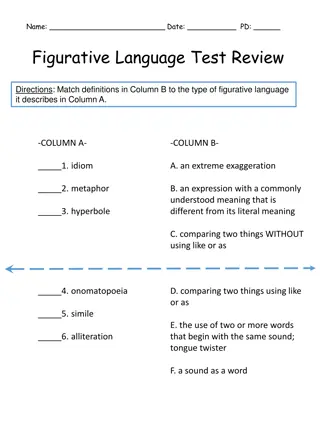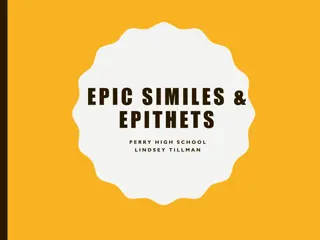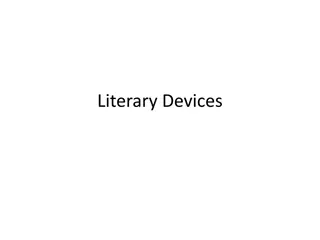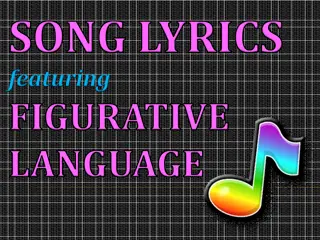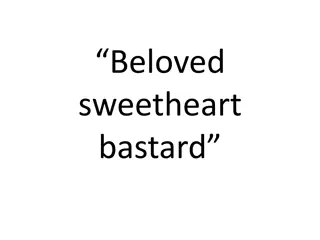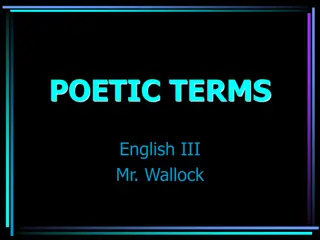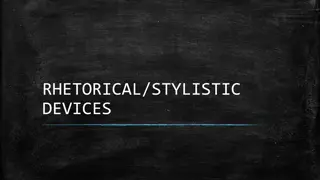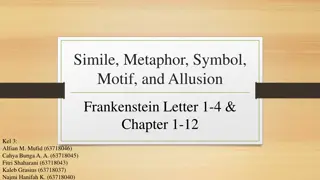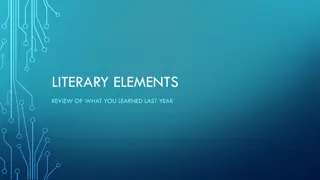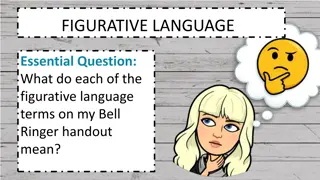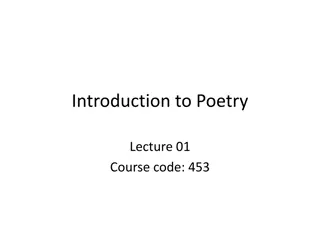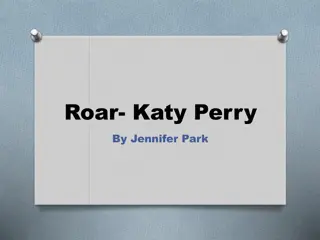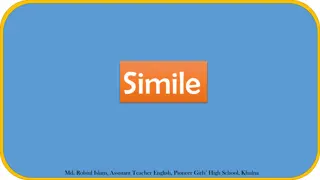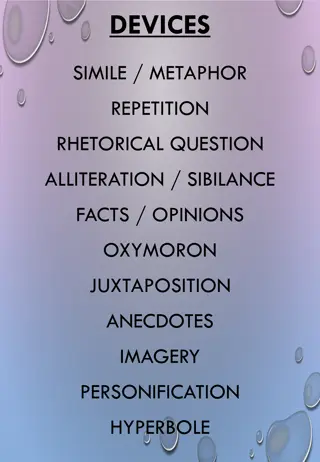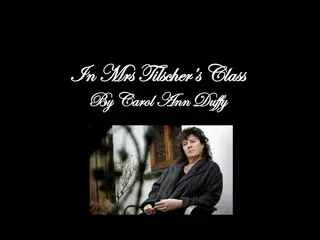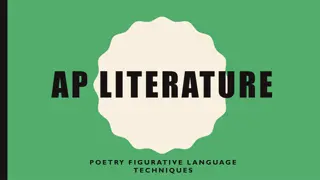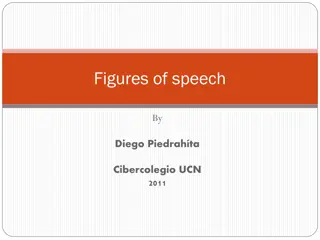Exploring Figurative Language: Hyperbole, Simile, Metaphor, Personification, Idiom, and Pun
Delve into the world of figurative language with examples of hyperbole, simile, metaphor, personification, idiom, and pun. Understand the art of exaggeration in hyperbole, the comparison of two objects in simile, the direct comparison in metaphor, giving human qualities to non-human entities in pers
1 views • 22 slides
Overview of Poetry Genres and Elements for English Students
Explore different genres of poetry including narrative, epic, dramatic, satirical, elegy, fable, and prose poetry. Delve into the unique elements of poetry such as diction and figurative devices like simile and metaphor. Engage with various examples from renowned poets and learn about the aesthetic
1 views • 25 slides
Figures of Speech
Explore the fascinating world of figures of speech with Dr. Somali Saha as we delve into the seven classes of figures. From simile to metonymy, antithesis to personification, you will discover the various ways language can be crafted to create engaging and impactful communication.
0 views • 10 slides
Exploring Literary Devices in 9th Grade English
Dive into the world of literary devices commonly studied in 9th-grade English classes. Discover the power of imagery in creating vivid sensory experiences, differentiate between metaphor and simile, explore extended metaphors that span beyond a single sentence, grasp the nuances of connotation and d
0 views • 7 slides
Understanding Personification, Simile, and Metaphor in Writing
Explore the concepts of personification, simile, and metaphor through examples and practice sentences. Understand how these literary devices enhance writing by giving non-human subjects human characteristics, comparing unlike things, and stating that one thing is another. Engage in exercises to iden
0 views • 6 slides
Exploring Figurative Language: Simile, Metaphor, Personification, Hyperbole
Figurative language enhances descriptions by comparing elements to create vivid imagery. This presentation explores simile, metaphor, personification, and hyperbole, providing examples and explanations for each. Similes use "like" or "as" to draw comparisons, while metaphors state facts metaphorical
0 views • 6 slides
Literary Terms Exploration in "Fish Cheeks" Short Story
Explore essential literary terms such as point of view, imagery, simile, metaphor, and personification in the short story "Fish Cheeks." Understand each term's definition with examples from the text, enabling a deeper analysis of Amy Tan's storytelling techniques.
0 views • 7 slides
Exploring Figurative Language in Literature
Figurative language adds depth and imagery to writing by using words or expressions in a non-literal way. Common examples include simile, metaphor, personification, onomatopoeia, hyperbole, and symbolism. Similes compare two unlike things using "like" or "as," while metaphors directly equate them. P
0 views • 8 slides
Understanding Alankara: The Art of Poetic Ornaments and Figures of Speech
Explore the world of Alankara in poetry, including its various types like Sabdalankar, Arthalankar, Vakrokti, and more. Dive into the essence of Alankara as the Dharma of Poetry, encompassing Mammat's seven types and the significance of different poetic elements like simile, metaphor, and indirect d
1 views • 5 slides
Literary Terms Challenge for 8th Grade Language Arts Students
Test your knowledge of literary terms with examples like "regular Einstein" and "eyes were fireflies." Identify terms like simile, foil, and hyperbole. Find out more about literary devices through engaging exercises.
3 views • 4 slides
Exploring Language Techniques in Poetry
Delve into the art of poetic expression through various language techniques such as simile, metaphor, personification, and more. Uncover how writers utilize these tools to create vivid imagery, evoke emotions, and enhance the overall impact of their work.
0 views • 7 slides
Literary Devices Quiz: Can You Identify the Figures of Speech?
Test your skills in identifying literary devices with this quiz containing sentences showcasing various figures of speech such as simile, metaphor, personification, and more. Each sentence challenges you to determine the type of figure of speech used, providing an engaging way to enhance your unders
0 views • 22 slides
Figurative Language Quiz: Test Your Knowledge!
Put your knowledge of figurative language to the test with this quiz. Identify popular figurative language terms such as hyperbole, simile, metaphor, alliteration, and onomatopoeia for different point values. Challenge yourself and enhance your understanding of figurative language through this inter
0 views • 75 slides
Exploring Techniques in Jabberwocky Poetry Lesson
Dive into the world of poetry with an analysis of Lewis Carroll's "Jabberwocky". Students will learn to identify and understand various poetic techniques such as simile, alliteration, onomatopoeia, metaphor, and personification. Tasks include translating stanzas, finding examples of metaphors, onoma
0 views • 10 slides
Analysis of "The Love Song of J. Alfred Prufrock" in B.A. Hons Final Year at I.B. P.G. College, Panipat
The dramatic narrative poem by T.S. Eliot, "The Love Song of J. Alfred Prufrock," explores themes of unexpressed love, fear of rejection, and societal pressures. The middle-aged narrator struggles with courage to express his feelings, reflecting on aging, unfulfilled desires, and the impact of socie
0 views • 6 slides
Exploring Figurative Language in "The House on Mango Street
Dive into the world of figurative language in Sandra Cisneros' novel "The House on Mango Street" by exploring examples of imagery, metaphor, simile, personification, hyperbole, alliteration, assonance, and consonance. Discover how these literary devices enhance the storytelling by painting vivid pic
0 views • 11 slides
Examining Literary Devices in Romeo and Juliet
This review explores key literary devices such as dramatic irony, situational irony, verbal irony, iambic pentameter, simile, metaphor, personification, imagery, and soliloquy in Shakespeare's Romeo and Juliet. Examples from the play illustrate how these devices enhance storytelling and character de
0 views • 17 slides
Figurative Language Test Review and Practice
Review and practice identifying various types of figurative language such as simile, metaphor, hyperbole, personification, and more through matching exercises, multiple-choice questions, and sentence explanations. Enhance your understanding of figurative language with this interactive test review.
0 views • 4 slides
Exploring Homeric Similes: Epic Comparisons and Analysis
Delve into the world of epic similes and epithets with a focus on Homer's works. Discover the beauty of these literary devices through vivid comparisons like a sponge absorbing water and a musician strumming a harp. Unravel the hidden meanings behind passages comparing suitors to caught fish and Ody
0 views • 12 slides
Exploring Literary Devices: A Comprehensive Guide
Delve into the world of literary devices with this comprehensive guide. From figurative language to alliteration, idioms to hyperbole, and more, learn how writers use these techniques to enhance their storytelling. Explore examples and visual representations to deepen your understanding of concepts
0 views • 11 slides
Exploring Figurative Language in Popular Song Lyrics
Dive into the world of figurative language through popular song lyrics featuring various literary devices such as alliteration, simile, personification, hyperbole, onomatopoeia, and more. Explore how artists like Nickelback, Sean Kingston, Michael Jackson, Owl City, Ke$ha, and others creatively use
0 views • 38 slides
Emotions of Love and Conflicted Feelings: A Literary Analysis
The literary analysis delves into the themes of love and conflicted emotions through the use of oxymoron, simile, and evocative imagery. The words "beloved" and "sweetheart" juxtaposed with "bastard" showcase the thin line between love and hate, while the simile of onion's scent highlights the dual
0 views • 4 slides
Understanding Poetic Terms in English Literature
Explore various poetic terms such as analogy, simile, hyperbole, and personification illustrated with vivid examples like "My love is like a red, red rose" and "His eyes were daggers that cut right through me." Learn how these literary devices enrich the imagery and meaning in poetry.
0 views • 60 slides
Exploring Rhetorical and Stylistic Devices in Speeches
Delve into the world of rhetorical and stylistic devices used in speeches, such as repetition, imagery, and devices of comparison like simile, metaphor, analogy, and juxtaposition. Understand how these devices enhance the impact and effectiveness of communication, with examples ranging from politica
0 views • 10 slides
Literary Devices in Frankenstein: Analysing Simile, Metaphor, Symbol, Motif, and Allusion
Explore the intricate use of simile, metaphor, symbol, motif, and allusion in Frankenstein through excerpts from Letter 1-4 and Chapters 1-12. Dive into the vivid comparisons, symbolic representations, and layered meanings embedded in Mary Shelley's classic novel.
0 views • 11 slides
Comprehensive Literary Elements Review
In this literary elements review, we delve into various aspects such as simile, metaphor, rhyme, repetition, alliteration, assonance, allusion, hyperbole, and personification. Understand the definitions of each element with examples provided, enhancing your knowledge of literary devices.
0 views • 20 slides
Understanding Figurative Language in English Literature
Explore the meaning and examples of various figurative language terms such as simile, metaphor, personification, onomatopoeia, oxymoron, idiom, hyperbole, allusion, and alliteration. Enhance your understanding of how these literary devices are used to add depth and imagery in writing.
0 views • 14 slides
Understanding Poetry: Forms, Devices, and Rhythms
Poetry utilizes various forms, devices, and rhythms to evoke emotions and convey multiple layers of meaning. Poetic devices such as rhyme, rhythm, metaphor, and simile play a crucial role in creating musicality and depth in poems. Understanding the organization of speech rhythms, accent patterns, an
0 views • 45 slides
Exploring Literary Devices in Katy Perry's Song Roar
Explore the use of literary devices in Katy Perry's song "Roar," including simile, metaphor, alliteration, hyperbole, onomatopoeia, and rhyme. Discover how Katy Perry creatively uses these techniques to convey powerful messages and emotions in her lyrics.
0 views • 8 slides
Understanding Similes in English Language: Examples and Explanation
Learn about similes and how they are used in the English language through examples and explanations provided by Md. Robiul Islam, an Assistant Teacher of English at Pioneer Girls High School in Khulna. Discover the definition of similes, common words used in similes (like, as, than), and see various
0 views • 9 slides
Exploring Literary Devices and Writing Structures in Composition
Understanding the nuances of literary devices like simile, metaphor, and repetition, along with rhetorical questions and alliteration, enhances the quality of writing. Delving into word types from nouns to superlatives refines language usage. Exploring sentence structures and the writer's perspectiv
0 views • 7 slides
Reflections on Childhood and Growth in "In Mrs. Tilscher's Class
The poem "In Mrs. Tilscher's Class" by Carol Ann Duffy narrates the poet's nostalgic journey from childhood innocence to young adulthood, reflecting on pivotal experiences during her time at school. The themes of loss, change, nostalgia, love, and safety intertwine as she transitions into adolescenc
0 views • 10 slides
Understanding Figurative Language Techniques in AP Literature Poetry
Exploring the purpose of figurative language in poetry adds depth and emotion to the text. Learn about key techniques like symbolism, metaphor, simile, personification, and allusion. Discover advanced concepts such as metonymy, synecdoche, allusion, synesthesia, hyperbole, and more. Delve into the p
0 views • 6 slides
Explore Figures of Speech by Diego Piedrahta
In this informative content by Diego Piedrahta, you'll delve into figures of speech, including examples like alliteration, anaphora, metaphors, simile, and antithesis. Learn how these rhetorical devices add depth and creativity to writing and conversations with their unique usage of words. The conte
0 views • 20 slides
